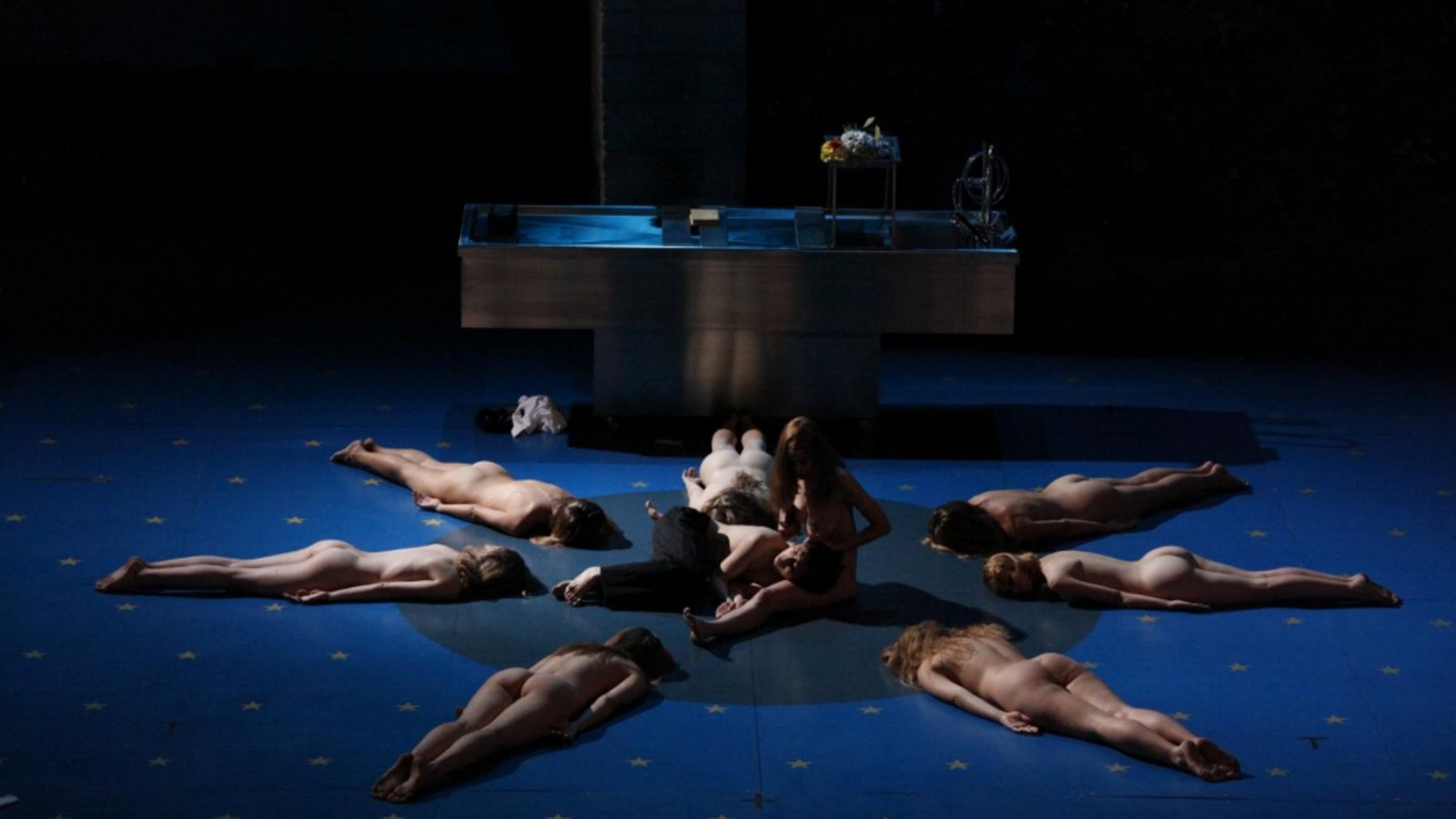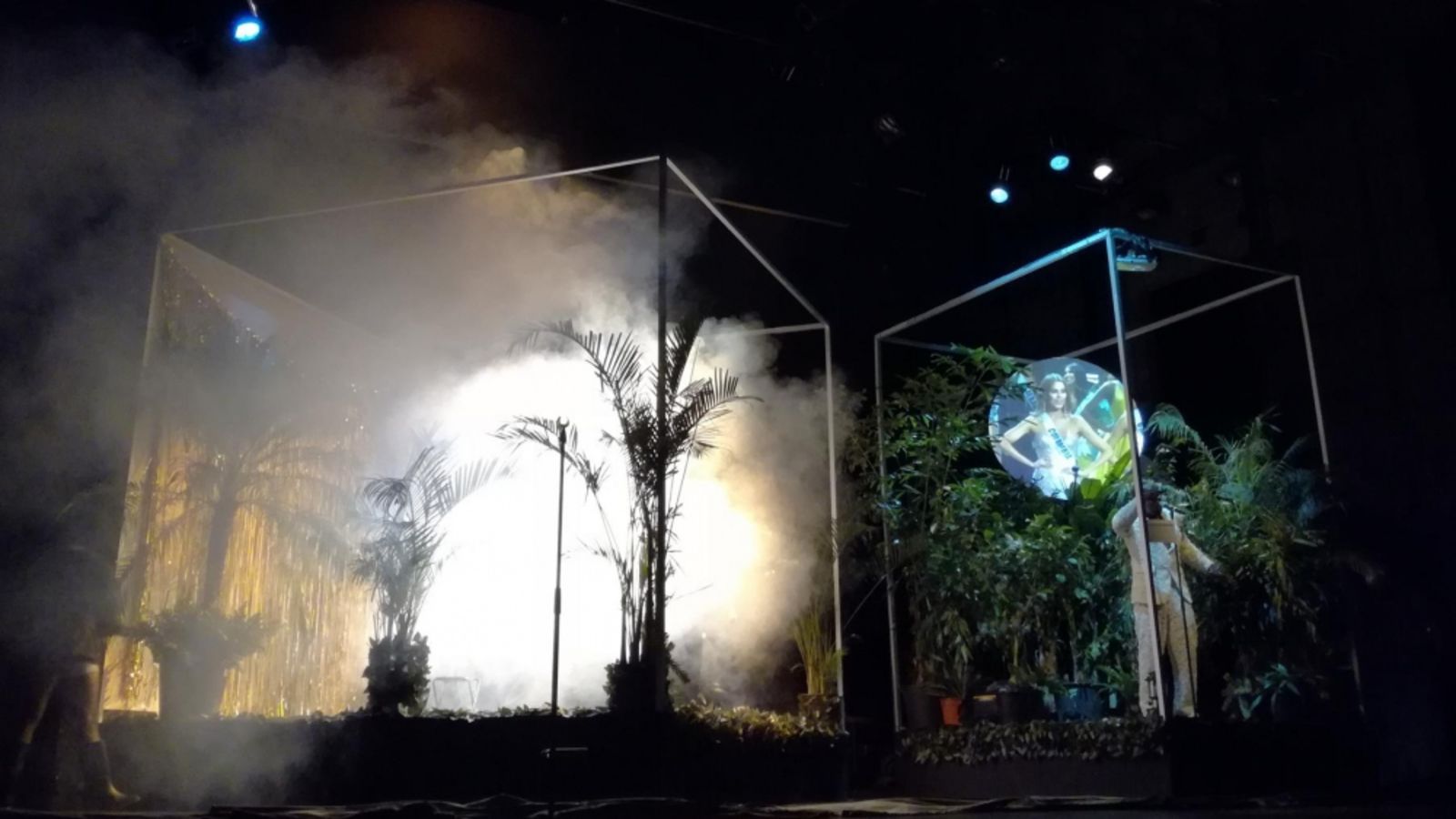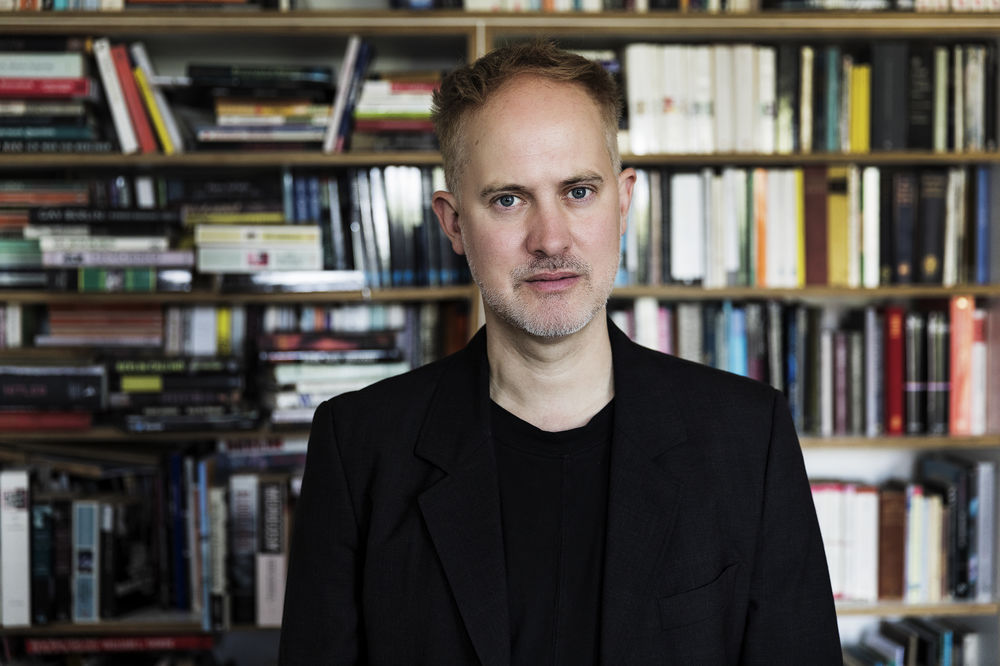

Theatre is for the Brave – Violence on Stage at FIND 2018
by Joseph Pearson
29 March 2018
Director Angélica Liddell tells me that she wishes to sacrifice herself, »immolate herself aesthetically«. But is violence something that we can believably experience in the theatre, from the safety of our seats? How does one transpose physical pain to the artistic realm?
The Festival International New Drama (FIND) at the Schaubühne has the »art of forgetting« as its broad theme. How historical violence, both individual and collective, can be translated to the stage becomes a central problem. Two large-scale productions in the Spanish language – from Colombia and Spain, and by Mapa Teatro and Liddell respectively – bookend the festival. They both share a poetic approach to violence, which can disrupt our calm, but also perhaps set us free.
»La Despedida« – meaning, »The Farewell« but also »The Leaving Party« – is the third panel of Mapa Teatro’s triptych on the »Anatomy of Violence in Colombia«, a narrative that spans more than fifty years of struggle. At the last FIND, Mapa presented another illumination from the cycle (called »Los Incontados«), an atmospheric journey into the ethno-fiction of narco-traffic violence, with innovative stage design. The triptych now culminates with a reflection on a new stage in Colombian history: the peace process following the armistice with FARC rebels.
I ask Rolf Abderhalden – who with his sister Heidi, is the creator of the project and Mapa – how they face the challenge of depicting violence theatrically for an audience, when we sit in the relative comfort of a theatre asked to engage with the horror. As he tells me, this »question is at the centre of our artistic creation. It’s what we have asked ourselves since we began working on this project, and asked while we were working in a context of violence [during Colombia’s conflict between the government and guerrillas movements]. How do we treat the subject, present experiences from life, the sensation of violence; how do we evoke it or transpose it, through text, scene, or sound, and put this shock and conflict on stage?«
Indeed, we can look to the traditional parameters for presenting violence on stage. Theatre can be a useful laboratory for catharsis: a containment strategy, a vicarious experience of violence diffused through pity and fear, as the Athenians suggested. Or we turn to the late Antique distrust of simulation, which was thought to damage our recognition of everyday emotions (I wonder if there’s an Augustinian take on virtual reality). And then there is the question of how this violence might even be represented. The term »obscene« finds its etymology in the Greek: »ob skena«, meaning »off stage«, because such violence was not meant to be shown directly (think Oedipus’s blinding). This notion is, more recently, regularly challenged, such as by Antonin Artaud’s Theatre of Cruelty, which arguably brought the obscene back on stage, at least in its efforts at sensory disruption. Director Romeo Castellucci articulated it to me in a previous interview; violence can be an »entrance strategy«, a trap for the spectator that brings down their defences. As he articulates: »We are talking about paying honour to violence. Of being worthy of this substantial violence. But it can also be expressed with an extreme gentleness. What is violence? It is not simply expressed through knives or scissors or blood. Violence is what you don’t expect; it takes you to unknown places«.
Rolf Abderhalden tells me that it would be impossible to provide precise parameters for how violence should be presented. Each of Mapa’s pieces has approached the problem differently. Indeed, »each director, or theatre group, grapples with the problem of violence in the world in their own way, as witnesses to it«.
But if one steps back and looks at Mapa’s approach more broadly, one sees that there is propensity not »to reproduce it on stage, for all those people sitting there, trapped in their theatre seats. We avoid a depiction that is too explicit«. The reason for this is perhaps based in Colombia’s ongoing relationship to and discussion of violence in daily life. As Abderhalden explains »More than in other places, the explicit dimension has been in evidence in daily life in Colombia, in the attacks on the public, on civil society. Our audience at home is now engaged in a peace process, and looks back on violence; finding it incomprehensible to believe that war, this »modus vivendi« in the country, and status quo, might be over. This is different than in other contexts where violence is not as present, explicit or as discussed«. The Colombian audience is well enough aware of the »ob skena« to require it reproduced, however artificially, in front of their eyes.
Mapa turns instead to what it describes as the »micro-political« (as opposed to the »macro-political«): that »aspect which evades the grand narratives of the State that are often homogeneous and hegemonic. We are interested rather in the more minuscule, in which multiple forms of violence are manifested or reproduced in our affect and our most simple gestures. The investigation into how the macro-political transforms into violence on the micro-political level constitutes an important element of our work. We ask the spectator to investigate his biggest life questions, and pose the question of how violence appears in our life in and through subtle degrees and modes«. But Abderhalden again avoids proscriptive formulations, concluding that »each director has their own poetic device for translating violence, and one’s strong rapport with it, to the stage«.
Angélica Liddell is both an electrifying performer and director; the Schaubühne has seen her in past FIND seasons with »All the Sky above the Earth (The Wendy Syndrome)« and in the axe-wielding »Dead Dog at Dry Cleaners: the Strong«. Her new production »¿Qué haré yo con esta espada?«, is, like »La Despedida«, a panel of a three-part project; hers is called the »Trilogy of the Infinite«.
»¿Qué hare… « explores the transformation of real-life violence into poetic violence and has, as its point of departure, two extreme acts: the November 2015 Bataclan theatre massacre and accompanying violence and a 1981 episode of cannibalism by a Japanese exchange student in Paris, Issei Sagawa. Liddell tells me that she could have drawn from any number of possible illustrations of violence from the mass media, but that she was interested in how these »two violent events worked on her nerve endings, and became the expression of intimate pain. As civilians, we resist the barbarians, but as poets we can love the assassin, or see the assassin inside of us, identify with her, and desire the homicide. We are fragile and complex. The explanation of the human soul does not depend on a social or materialist, cross-cutting, theory, but rather a dangerous vertical ascent to the incomprehensible«.
European societies arguably try to push violence to the margins, render it invisible. Violence is something than often happen in other places, to other people, or on the news. I ask Liddell about her approach to violence. And whether it is then something to be celebrated, harnessed, used?
Liddell makes precise that she is not interested in explicit physical, but rather »spiritual violence«. She goes so far as to state that this spiritual violence is essential to remain human.
»I speak of the necessity to recognise it in oneself. There is nothing more violent than sex and death, which is why they are the first things to be prohibited. I am speaking of taboos, and the necessity to destroy these taboos by way of symbols. I speak of poetic law confronting the law of the State. There are different. The law of the state creates taboos. The law of poetry transgresses. This is the tragedy: poetic law’s transgression is made possible by the hyper-moral. In some way the forbidden must occur: and it does so through myth«. Violence then operates on a poetic level – poetry itself is the actual attack on an established moral order.
I ask Liddell whether she is out to shock. The piece showcases what Le Monde has called, after all, the »director’s capacity to create on stage a space without mental and physical limits, a magnetic field of human madness and excesses« culminating in a bacchanal – involving, of all things, octopus – worthy of the »120 Days of Sodom«. But Liddell resists this reductionism, and tells me that she »does not work with shock but with poetic violence that restitutes intimacy with our instincts. I am interested in spiritual conflict. The relations of man with himself are inevitably violent, that descend into areas of the unconscious that emerge through symbols… The violence is the need for these works to hurt our sensibilities, to hurt them deeply. The relief that poetry provides is its ability to wound ever more deeply, and it does this without warning because that is what we all want: for theatre to hurt us«.
But I am not convinced everyone wants to come to the theatre to witness the micro-political subtleties of Mapa Teatro, or the spiritual wounding that Liddell believes is necessary for our humanity. Both are poetic manipulations that are likely to unsettle or – in the words of the neoliberal academy – »trigger«. One need not even appeal to the unconscious in this formulation. Enough research has been completed in cognitive psychology to show emotion’s strong effect on memory when it comes to the retrieval of traumatic events (so-called »mood-state dependent retrieval«). And if theatre jolts us with poetic violence, might it then also spur us – perish the thought – to fear and pathos? Theatre becomes the opposite of a safe space, and instead an intentionally triggering space, a place for confrontation. Theatre is for the brave. For do not our histories of violence need to be re-invoked – not simply as a warning, but also as a cry of resistance, even of freedom – if we no longer wish to be slaves? Either to resist an unreflective memory culture, or a culture that privileges our weakness, and manipulates our fear of being harmed?
Pearson’s Preview

Archive
April 2024
Icy Myths in the Russian East
The Exiles of KnAM’s »My Little Antarctica« at the Schaubühne
April 2023
FIND 2023
Nostalgic, Not Sentimental
The Wooster Group as »Artist in Focus« at the Schaubühne
| Page 1 of 10 pages |
